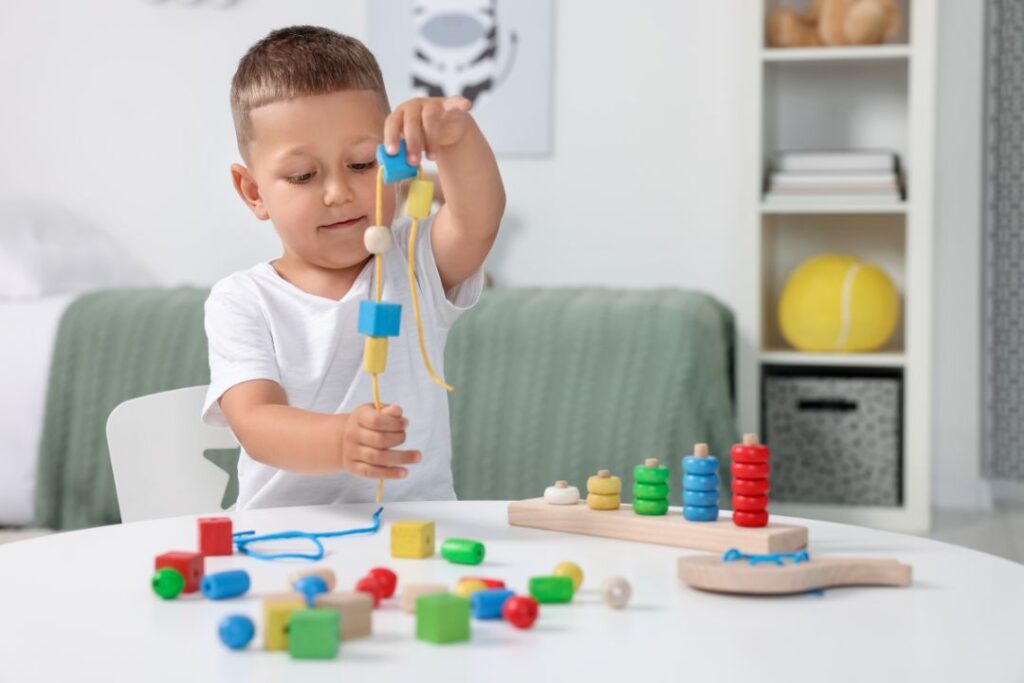Author: Tayla Gabin, Paediatric Occupational Therapist
4 min read
When most people think of fine motor skills, pencil grasp is often the first thing that comes to mind. But these skills go far beyond writing. They are essential for everyday independence, whether it’s getting dressed, feeding oneself, or managing school supplies.
As paediatric occupational therapists, we understand that these small but mighty movements are the foundation for a child’s confidence, capability, and connection to their world.
Why Fine Motor Skills Matter
Fine motor skills involve the coordination of small muscles in the hands and fingers. These muscles support tasks such as:
- Zipping up a jacket
- Tying shoelaces
- Using cutlery
- Opening containers
- Buttoning shirts
When a child finds these tasks difficult, it can impact their confidence and willingness to try new things. That’s why supporting fine motor development early and consistently can make a lasting difference.

Beyond the Classroom
While handwriting often gets the spotlight, fine motor skills are crucial for many other areas of life. Let’s take a closer look.
Dressing Skills
Zips, buttons, and laces all demand finger strength, dexterity, and coordination. They also require bilateral coordination, the ability to use both hands together, such as holding fabric with one hand while zipping with the other.
Mealtime Independence
Opening a lunchbox, using a fork or spoon, or pouring from a jug all rely on precise hand movements. These activities build graded control, adjusting the pressure and speed of movement to match the task.
Play and Everyday Tools
From using scissors to building with Lego or turning pages in a book, many play experiences develop fine motor skills naturally. Play is one of the most powerful ways children practise and improve their skills without pressure.
Easy Ways to Support Fine Motor Skills at Home
The great news? You don’t need special equipment. Everyday play is full of opportunities to support fine motor skills in fun and engaging ways.
1. Kitchen Play
Invite your child to help with cooking. Stirring, pouring, cutting with cookie cutters, or using tongs helps build coordination and strength.
2. Dressing-Up Games
Costumes with zips, buttons, or ties make dressing fun. Dolls or toys with clothes to fasten are also excellent for practising these skills.
3. Crafty Hands
Playdough, bead threading, cutting, gluing, or using tweezers all build hand muscles. These activities are easy to adapt to your child’s interests and skill level.
4. Sensory Treasure Hunts
Hide small toys in playdough or a rice tub and encourage your child to dig them out using fingers or tweezers. It combines sensory exploration with motor development.
5. Mealtime Helpers
Get your child involved in snack prep such as, peeling mandarins, spreading butter, or pouring drinks are great for building control and confidence.
6. Lace and Thread Toys
Lacing cards, threading pasta, or using sewing boards improve fine motor control and encourage the use of both hands together.

Watch for Frustration
Some tasks will feel tricky, especially at first. It’s important to create a space where your child feels safe to try, make mistakes, and grow at their own pace.
Celebrate effort over perfection. If your child often avoids fine motor tasks or becomes easily frustrated, consider reaching out to a paediatric occupational therapist. Small adjustments in your approach can lead to big gains in confidence and skill.
Final Thoughts
Fine motor skills are about more than pencil grasp, they empower children to engage with daily life independently and joyfully. Through playful routines and consistent encouragement, these skills can develop in natural, meaningful ways.
Let’s keep the focus on connection, confidence, and capability, not just performance.
If you feel like your child is struggling with fine motor skills, talk to an occupational therapist for further guidance. Contact MoveAbout today. Check out our Facebook and Instagram pages for more education regarding sensory processing and regulation.


